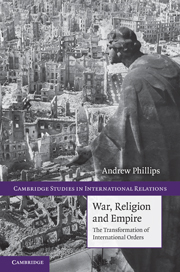Book contents
- Frontmatter
- Contents
- List of tables
- Acknowledgements
- Introduction
- PART I Conceptual framework
- 1 What are international orders?
- 2 Accounting for the transformation of international orders
- PART II The historical transformation of international orders
- PART III Contemporary challenges and future trajectories of world order
- Conclusion
- Bibliography
- Index
- Cambridge Studies in International Relations
2 - Accounting for the transformation of international orders
Published online by Cambridge University Press: 10 January 2011
- Frontmatter
- Contents
- List of tables
- Acknowledgements
- Introduction
- PART I Conceptual framework
- 1 What are international orders?
- 2 Accounting for the transformation of international orders
- PART II The historical transformation of international orders
- PART III Contemporary challenges and future trajectories of world order
- Conclusion
- Bibliography
- Index
- Cambridge Studies in International Relations
Summary
Existing accounts for the transformation of international orders
How are international orders transformed? A range of suggestive but incomplete answers may be drawn from the literature on international systems change. Cyclical theories of order emphasise international orders' dependence on the fate of great power sponsors, with their transformation being driven by shifts in the balance of power away from conservative status quo powers and towards more dynamic revisionist powers. Linear-process theories, conversely, see international orders as the systemic residue of largely endogenous processes of state formation. Seen through this lens, the nation-state's contemporary ubiquity is a testament to a centuries-long process of Darwinian institutional selection, with the global state system representing nothing more than the most efficient available means of organising political authority on a global scale. A third set of perspectives conceptualises international systems change in terms of punctuated equilibria, affording causal primacy either to far-reaching transformations in the mode of production or destruction, or to the irruption of subversive new forms of collective identity in explaining orders' transformation. Each of these accounts provides valuable insights, but none by itself is adequate as an explanation for international orders' transformation.
International orders and the rise and fall of Great Powers
The notion that international orders are hostages to the fortunes of their Great Power sponsors superficially has much to commend it. Intuitively, it makes sense that orders would reflect the interests of the powerful, and that they would tend towards disintegration as their sponsors' relative power ebbed.
- Type
- Chapter
- Information
- War, Religion and EmpireThe Transformation of International Orders, pp. 34 - 56Publisher: Cambridge University PressPrint publication year: 2010



